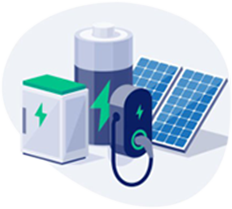
-
[email protected]

-
Building 1, No. 21 Shengfa Road, Lucheng District, Wenzhou, Zhejiang, China


Solar power stands out as a versatile and reliable solution for various applications. From large-scale installations to residential setups, solar energy systems are being tailored to meet diverse needs.

Ground-mounted photovoltaic (PV) systems represent a significant leap in the deployment of solar energy, particularly for large-scale applications. These systems are installed on the ground rather than on rooftops, allowing for the utilization of vast areas to generate substantial amounts of electricity.
One of the primary advantages of ground-mounted PV systems is their scalability. Unlike rooftop installations, which are limited by the size of the building, ground-mounted systems can cover large tracts of land. This enables the installation of thousands of solar panels, capable of generating megawatts of power. Such systems are often found in rural areas or on unused land, where they can operate without interfering with other land uses.
Another benefit of ground-mounted PV systems is their flexibility in design and orientation. Panels can be tilted and oriented to optimize sunlight capture throughout the day and across different seasons. Some systems even incorporate tracking mechanisms that adjust the angle of the panels in real-time, big energy production. This adaptability ensures that ground-mounted systems can achieve high efficiency, even in regions with varying sunlight conditions.
Moreover, ground-mounted PV systems can be integrated with other land uses, such as agriculture. In some cases, solar panels are installed above crop fields, creating a dual-use system that generates electricity while allowing for continued agricultural production. This innovative approach, known as agrivoltaics, bigs the use of land resources and promotes sustainable practices.
Hybrid solar energy systems combine solar power with other energy sources to create a more reliable and versatile energy solution. These systems typically integrate solar panels with energy storage systems, such as batteries, and may also include backup generators powered by fossil fuels or other renewable sources. The goal is to ensure a continuous and stable supply of electricity, even during periods of low sunlight or high demand.
The integration of energy storage is a key feature of hybrid solar energy systems. Batteries store excess solar energy generated during the day, allowing it to be used at night or during cloudy weather. This ensures that the system can provide power around the clock, reducing reliance on the grid and lowering electricity costs. Additionally, the presence of a backup generator provides an extra layer of security, ensuring that power is available even if the batteries are depleted and solar energy is insufficient.
Hybrid solar energy systems are particularly beneficial for remote locations or off-grid communities, where access to the electrical grid is limited or unreliable. They offer a self-sufficient energy solution that can operate independently, reducing the need for expensive and environmentally harmful diesel generators.
Hybrid solar home systems bring the benefits of hybrid technology to residential settings, offering homeowners a reliable and sustainable energy solution. These systems combine solar panels with energy storage and, in some cases, a backup generator, providing a comprehensive energy management system for the home.
One of the main advantages of hybrid solar home systems is their ability to reduce electricity bills. The stored energy can also be used during power outages, ensuring that essential appliances and devices remain operational.
The diverse range of solar energy systems available today highlights the adaptability and potential of solar power. Ground-mounted photovoltaic systems offer large-scale energy generation, making them ideal for utility projects. Hybrid solar energy systems combine multiple energy sources to provide reliable and versatile power solutions, suitable for both remote and grid-connected applications.
Your email address will not be published. Required field are marked*
